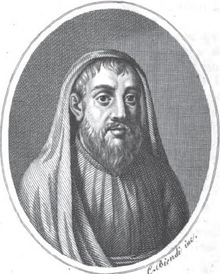Philistion of Lokroi
Philistion of Lokroi (* around 427 BC; † around 347 BC) was one of the most famous doctors of his time. He came from the Italian , Greek-populated city of Lokroi (today Locri ) in Calabria and was a contemporary of the philosopher Plato , whom he must have met personally during his multiple stays in Syracuse .
At that time, Philistion's hometown of Lokroi had lively relations with Syracuse, as the wife of the Syracusan tyrant Dionysius I , Doris , came from there. Philistion may have come to Syracuse in connection with this wedding, where he then served as personal physician to both Dionysius I and his son and successor Dionysius II , who came from his marriage to Doris . As such, he must also have been involved in the events of Dionysius I's death, which Plutarch reports and which led to the heirs of the tyrant's second wife, Aristomache , who came from Syracuse, not being taken into account in the succession plan. Allegedly, the seriously ill tyrant received a powerful remedy from his doctors on the basis of an instruction from his son Dionysius II, by which he was put to sleep before he could change his testamentary dispositions.
Philistinism, who must have been in scientific contact with Plato, is mentioned in the “Second Letter” wrongly attributed to Plato.
In his scientific ideas, Philistion, a member of the Sicilian Medical School , was influenced by the teaching of Empedocles on the four elements. He understood the human body as a mixture of these four elements. For him, health consisted of the correct (numerical) relationship between these elements. Plato agrees with this thesis, but differs from Philistinism in that he does not regard the four elements as the final units. It is possible that Plato's cosmological and medical ideas are based on knowledge that Philistinism gave him.
Text output
- Max Wellmann (ed.): Fragments collection of the Greek doctors . Volume 1: The fragments of the Sicilian doctors Akron, Philistion and Diocles of Karystos . Weidmann, Berlin 1901, pp. 67 ff. And 109–116.
literature
- Véronique Boudon-Millot : Philistion de Locres . In: Richard Goulet (Ed.): Dictionnaire des philosophes antiques , Vol. 5, Part 1, CNRS Éditions, Paris 2012, ISBN 978-2-271-07335-8 , pp. 331–333
- James Longrigg: Greek Rational Medicine. Philosophy and medicine from Alcmaeon to the Alexandrians . Routledge, London 1993, ISBN 0-415-02594-X , pp. 104-113
- Wolfgang Wegner: Philistion of Lokroi. In: Werner E. Gerabek , Bernhard D. Haage, Gundolf Keil , Wolfgang Wegner (eds.): Enzyklopädie Medizingeschichte. De Gruyter, Berlin / New York 2005, ISBN 3-11-015714-4 , p. 1150
- Georg Wöhrle : Studies on the theory of ancient health . Franz Steiner Verlag, Stuttgart 1990, ISBN 3-515-05599-1 , pp. 89-91
Remarks
- ^ Pseudo-Plato, Second Letter 314 d – e.
| personal data | |
|---|---|
| SURNAME | Philistion of Lokroi |
| ALTERNATIVE NAMES | Philistinism |
| BRIEF DESCRIPTION | doctor |
| DATE OF BIRTH | around 427 BC Chr. |
| DATE OF DEATH | around 347 BC Chr. |
